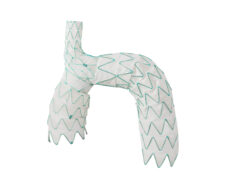Through five years following initial implantation in a FDA?approved study, the Talent Abdominal Stent Graft from Medtronic demonstrated durable safety and effectiveness in patients with abdominal aortic aneurysms, despite having included patients with more challenging anatomies than comparable trials of similar medical devices.
The five-year results from the Talent AAA US IDE (investigational device exemption) trial were presented on 12 June 2009 at the clinical trial session of the Society for Vascular Surgery (SVS).
The study results support the long?term safety and efficacy of the Talent Abdominal Stent Graft in the minimally?invasive treatment of abdominal aortic aneurysms. Earlier data from the study contributed to the original FDA approval for the device in April 2008. These latest data constitute the final results of the study, which involved 166 patients enrolled between February 2002 and April 2003 at 13 clinical research sites in the United States.
“In a population with more challenging anatomical characteristics than in other clinical trials of similar technologies for endovascular repair of abdominal aortic aneurysms, the Talent Stent Graft System compared favorably with open repair through one year,” said Luis Sanchez, Washington University Hospital in St Louis, who shared the findings with hundreds of physicians attending the 2009 Vascular Annual Meeting. “More importantly, the Medtronic device also provided sustained protection from aneurysm?related mortality through five years, with minimal reinterventions.”
The study’s primary safety endpoint compared a composite of major adverse events to an historical control of 243 patients who underwent conventional open surgical repair of their aneurysm. Freedom from major adverse events at 30 days was 89.2% in the Talent AAA group and 44% in the open surgical repair group.
The effectiveness endpoint assessed successful aneurysm treatment, defined as technical success with device placement, as well as freedom from aneurysm growth greater than 5mm and freedom from type I or III endoleak, at one year. Successful aneurysm treatment at 12 months was obtained in 90.2 % of the Talent AAA study population.
Other highlights of the five?year outcomes include a 96.5% freedom from aneurysm?related death, freedom from AAA rupture of 98.2%, freedom from conversion to open repair of 99.1%, and freedom from migration of 97.7%.
“At five years, not only were outcomes related to aneurysm-related mortality, conversion to surgery and rupture satisfactory, but the incidence of device migration was only 2.3%,” said principal investigator Frank Criado of Union Memorial Hospital in Baltimore.
Importantly for interpreting the results, this study enrolled a significant number of patients with challenging abdominal aortic aneurysm morphology who would have been excluded from IDE trials of other stent graft products because of stricter inclusion criteria in those trials and limited device size offerings.
The Talent Abdominal Stent Graft expands the applicability of endovascular aortic repair, enabling more patients to benefit from a less invasive alternative to open surgical repair. Talent AAA is the only stent graft approved by the FDA for use in the treatment of abdominal aortic aneurysms with proximal necks (“landing zones”) as short as 10mm. The Talent Abdominal Stent Graft System has been used internationally since 1997 to repair the aortic aneurysms of approximately 50,000 patients.













